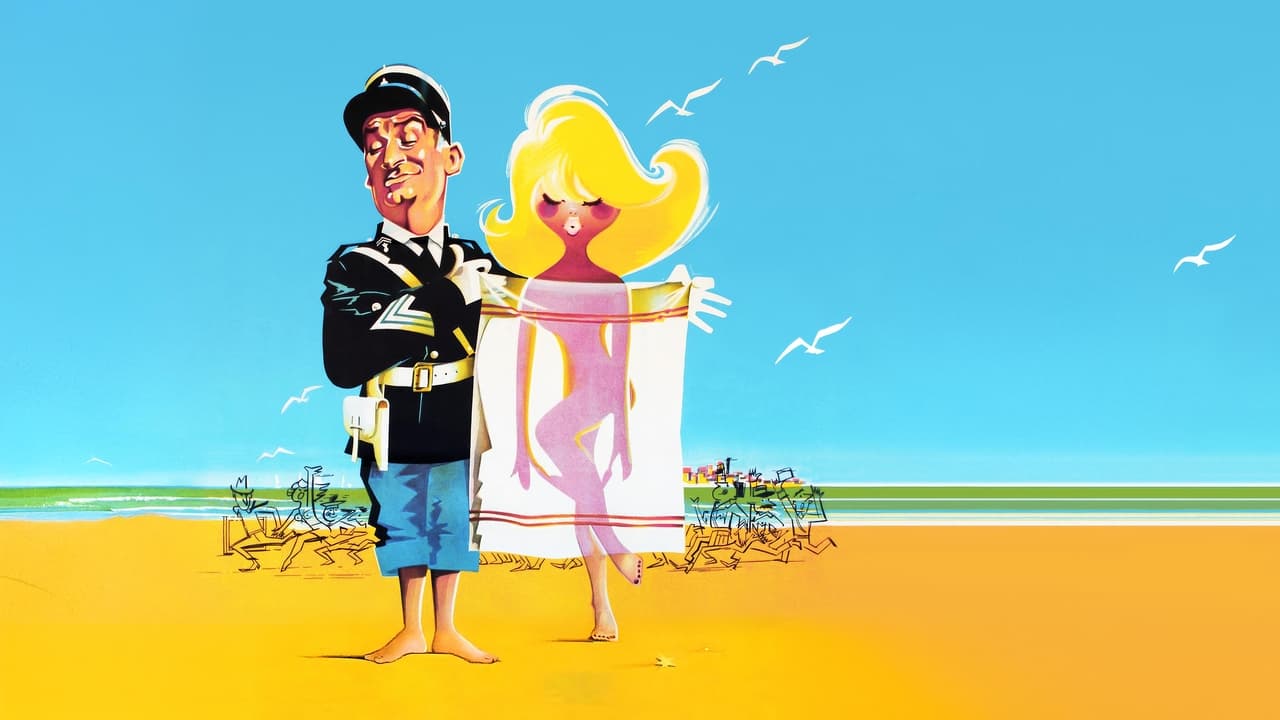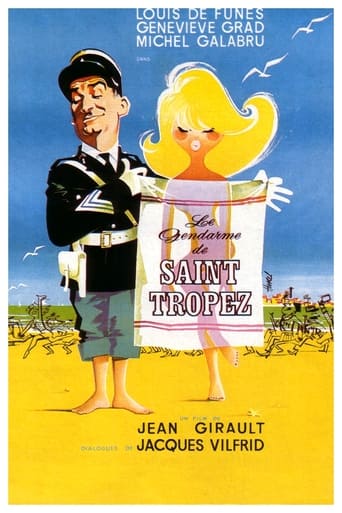

A bit overrated, but still an amazing film
... View MoreAlthough it has its amusing moments, in eneral the plot does not convince.
... View MoreOne of the best movies of the year! Incredible from the beginning to the end.
... View MoreIt is neither dumb nor smart enough to be fun, and spends way too much time with its boring human characters.
... View MoreSaid differently, this is the film that launched the career of Louis de Funès in 1964. He was no newcomer and had already twenty years of experience collecting small roles on the screen and bigger ones on the stage, but fate was only waiting for the last scraps of hair to disappear on the top of his head so he could get on the top of the box office for almost two decades. The movie would also span a series of sequels and become the most emblematic role of his career. See, there are many elements of history movie buffs will enjoy in this film so I'm afraid it doesn't leave much to say about the film itself, but the elements of context are vital because they help to understand the reasons begind one of the most successful careers of French cinema.We are in the middle of the 60's, at the culmination of what they call the "Glorious Thirties", France has become a major international political player, intoxicated by the aura of General De Gaulle, the Algerian war is over, and the first baby boom generation is coming to age and can enjoy their first great summer holidays. But as far as summer was concerned, there was one place to be, and it was Saint Tropez. You don't know how big Saint Tropez was in the 60's? Are you kidding?The place's story is almost as legendary as Las Vegas, it was a remote beach station in the Mediterranean South that became cherished by the New Wave stars, one of its most memorable ambassadors was the loveliest mermaid: Brigitte Bardot. One running gag in the 1972 comedy "The Annuity" is that the film starts so early in time the name "Saint Tropez" never rings a bell and this is where the poor schmuck bought a little house at a cheap price. To end on the trivia, the dubbing in "The Sword in the Stone" had "Bermuda" replaced by "Saint Tropez".So the town was the Mecca of fun, vacation and amusement, and when a screenwriter came to a real St Tropez gendarme station after his camera was stolen, he was told to come after nap time, a joke worthy of an Astérix album that convinced him to make fun of them in his next project. The premise was in line with the city's popularity, all they needed was an actor. De Funes had made a few successes in 1963, the most notable one was "Pouic Pouic" but producers were rather reluctant, they only hired him in exchange of several cuts in the budget and hiring second-rate actors. Michel Galabru would eavesdrop a conversation revealing that they were looking for such a cast and a few time later, he got the offer. His career was launched as well. And so was the team made, with Louis de Funès as iconic Ludovic Cruchot and Galabru as Adjutant Gerber. The masterstroke of the script, where De Funès was involved, was to make Galabru the superior. So there's a very interesting opening in the Alps region where we see Cruchot operating with some cattle thief and then getting a letter of promotion. The opening is full of comical moments but it's the choice of monochrome shooting that creates the exhilarating feeling when it jumps to color and to the catchy music of "Do You Saint Tropez", so typical of French youth passion for American music.This transition is literally De Funès career in microcosm, from the black and white little roles to the thundering and joyful sixties. And his arrival at Saint Tropez with his daughter Nicole (Genevieve Gard, who sings the song) is actually one of the most pivotal moment of comedic and French popular cinema. It's not just about De Funès but popular cinema had just stolen the thunder from snobbish New Wave directors. And that feels good, too.But there's more in casting De Funès as the newcomer and not the highest ranked, it allows him to plays what would become his most famous shtick: authoritarian and overzealous with the subordinates ("look at me in the eyes", with the pointing fingers was his first catchphrase) and honey-mouthed with the superior. The interaction between the gendarmes are some of the film's greatest moments, and they work so well, you actually don't wait for a plot to spoil these moments.And yet the plot involving the nudist camp is actually very well done and contribute to some of the film's best moments when Cruchot improvises himself a drill sergeant instructor and when for the first time, the catchy theme of the Gendarme march composed by Raymond Lefebvre is played, the tune echoes the iconic Colonel Bogey March and became a standard of French cinema. Many elements from the movies would be used in the later sequels, the relationships between Gerber and Cruchot, their challenging authority moments, the crazy driving nun, the march, but they all carry a special charm for the simple reason than we're watching them for the first time and because this is De Funès finally being given his leading role and being at the top of his game. In the context of the film, it's fresh and original. Although I conceded it suffers from the usual De Funès syndrome where the second half is less interesting than the first. Still, this a real product of its time, it has De Funès, it has baby boomers, it has twist, it has St Tropez, and even a nod to Général De Gaulle at the end, it is one of the most emblematic movies of the 60's with one of the most emblematic actors, and for all the budget it took, it was the most successful movie of the year with more than 7 million viewers, not bad?
... View MoreTHE TROOPS OF ST. TROPEZ is a hilarious comedy, which brings an abundance of a cheap humor and fast fun. This is a somewhat satirical look at some serious social issues that rotate continuously in the story. That is, from the beginning, very frivolous.Ludovic Cruchot, a gendarme is the embodiment of the law in a small French village. He has been re-assigned to the seaside commune of Saint-Tropez under the orders of command sergeant major Gerber. His beautiful and rebellious daughter goes with him. The gendarmes have a serious problem: a group of persistent nudists. However, Cruchot has an "ingenious" plan. Meanwhile, his daughter comes in contact with a gang of thieves...This is a very pleasant and short amusement, regardless of the whole range of unpleasant coincidence. The scenery is is a big hit, because it distracts attention from a distorted perspective on society. There is no place for a parody, this is a comic charade with unclear directions. Mr. Girauld has managed to shuffle all the elements, such as family, crime, religion, youthful rebellious spirit and incompetent guardians of law and order.Louis de Funès as Ludovic Cruchot has, given to his movements, noises, grimaces and gestures, completely stole the show. He has an aesthetic sense of humor, which is accompanied with his enormous energy. Well, Cruchot somewhat reminiscent on well known inspector Clouseau. Geneviève Grad as Nicole Cruchot is a beautiful girl from a province who comes into a tourist paradise. She has two problems: her youthful rebellious nature and a strict father, who happens to be a hyperactive gendarme. Michel Galabru as warrant officer Jérôme Gerber is preparing for the madness, at least for now.The films about gendarmes from a hot French coast are, like many other things, a part of my childhood.
... View MoreThe Gendarm is one of these movies which get aired in Germany at least twice a year on television on public holidays. Shame on me I never took the opportunity to give it my full attendance. So now when it got re-released on DVD in a box containing the first 3 flix with Louis De Funes as Gendarm Cruchot I gripped my chance and was in no way disappointed.In the first 10 minutes of his movie (which I never saw before) we are introduced to the choleric character of a county policeman arresting fish and chicken thieves and singing in the church choir. This piece of film is in black and white contrasting the colorful scenes at St Tropez later on. Already these first 10 minutes are the work of a genius in humor. De Funes never fails to amuse with his extraordinary combination of being the law abiding correct police officer and same time unable to control his overwhelming emotions as depicted in his facial expression and excessive gestures. With this he is throughout the movie never overacting like in some of his later works.About the main part of the movie we see him elevated to lead a fearless four of flics in the mundane town of St Tropez on Mediterranean Cote D'Azur. Some story lines are welded together about nudist bathers (are they in existence still?), young folks doing some vandalism and finally a big robbery of a classical painting which he can (by chance for sure) resolve. These are used to include some extraordinary political and social satire sub-tones like Louis leading his flics into assault on nude people on the beach like famous French Foreign Legion soldiers in desert wars.I was brilliantly entertained by this comedy and could laugh out loud on some of the punchlines and almost dadaist slapstick. Oh, and you won't forget the catchy St Tropez tune performed by his film daughter and featured 3 times in the film. I give it 8 out of 10.Additional trivia for German version: In the restored version on DVD we see some short scenes which were cut from the theatrical version, recognizable by not being overdubbed with German synchro. They do not add much to the story but fit into the picture of a great comedy.
... View MoreVery much a 1960s style European beach comedy. The plot won't win any literary prizes, the gags are little better than average, but the comic timing of Funes, Lefebvre, Galabru, etc. is brilliant, study material for acting school. This is very much a feel-good slapstick comedy with the usual towering central performance of Louis de Funes in the title role, a prime example of a central character carrying a movie.The best bit of the film is the black-and-white pre-credit opening sequence, set before Cruchot's move to St.Tropez. The scene with the chicken-thief and the choir is priceless.
... View More